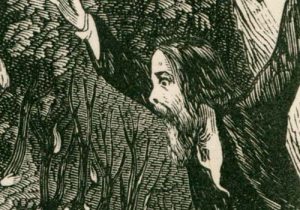In this excerpt from the autobiography of North Carolina itinerant preacher Joseph Thomas, the author describes the formative role played by the jerks and other bodily exercises in stirring him to seek conversion. At a camp meeting later that year, Thomas—who was only fourteen years old—first “began to feel the mighty influences of grace” upon his soul. Click here for the full text of Thomas’s Life of the Pilgrim (1817).
About the first of March, 1806, went again to Carolina to comply with the engagement I had made with my brother James. Having lived here but a short time, frequently attending meetings of worship, my soul was more troubled than ever. I soon came to understand the subject of religion in theory and that I was destitute of its pure and spiritual nature in practice. The beams of righteousness now began to penetrate every avenue of my carnal heart, and the illuminations of the gospel developed all the sins and evils of my life. I now could more amply contemplate on the divine goodness to me, and on my own perverseness, and the more behold my wretched state. I now became serious indeed, but without any singular, sudden or pungent conviction; and was the more encouraged as it was no uncommon thing at that time, for many of the youth, as well as the aged of the neighborhood to be in distress for their souls, to profess conversion, and to exhort the ungodly to do better. This was in the time of the celebrated, revival that took place in the Hawfields (near where I lived) and went on through Guilford, Rockingham, Randolph, Casewell and many other counties where hundreds and thousands professed to be converted and brought to the knowledge of the truth. In this revival the very singular and unaccountable exercises of the jirks, dancing, hollowing, shouting, laughing, &c. were prevalent among those who professed religion. In my serious reflections and enquiries after the salvation of my soul, the various noise and exercise of the people would oftentimes stagger me. I was sometimes rather doubtful, and almost led to believe that it was all enthusiasm and strong delusion. Yet, that Christ was the soul of God, came to be the Saviour of the world; that he died for the remission of sins; rose from the dead for justification of life; that he demanded repentance of us all, and faith in his name, and that we should love, serve and obey him in all things commanded, were truths which remained incontestible on my mind. From this persuasion I was led not only to see the beauty of the New Testament religion, but the necessity of seeking the Saviour till I found redemption through his blood, even the forgiveness of sins. I now had determined to cease all my sinful ways, and if it pleased God to have mercy on me and let me feel peace with him through the Lord Jesus Christ, I thought would lead a religious and holy life, and make no such loud profession and noise about it as was common among those who experienced a change. I now read much in the scriptures; went often to meeting; frequently prayed and began to feel a new pleasure while walking, as I thought the people of God walked, I had almost forgotten my sins, began to depend much in the good I had done, and well nigh concluded that my upright actions merited the favor of God and an acceptance with him. Little did I know the stratagem the devil was taking to slay me. Here I was at ease, not feeling that I was a sinner condemned to die, nor crying Lord save me or I perish, but depending in a few imperfect prayers for the great salvation of my soul! Thanks be to my heavenly father that he did not let me sleep long in this mistaken state of self-security. Praise to my Saviour that he perpetuated his trials of grace toward me, and brought me to a full discovery of my lost condition before it was too late to call upon him and be saved.
Source
Joseph Thomas, The Life of the Pilgrim, Joseph Thomas, Containing an Accurate Account of His Trials, Travels, and Gospel Labours (Winchester, Va.: J. Foster, 1817), 11–12.



